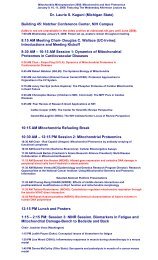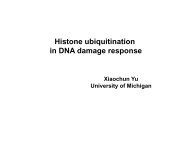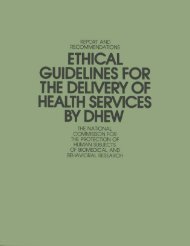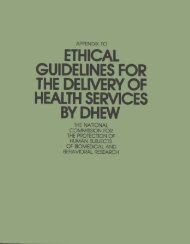RESEARCH ON THE FETUS - National Institutes of Health
RESEARCH ON THE FETUS - National Institutes of Health
RESEARCH ON THE FETUS - National Institutes of Health
You also want an ePaper? Increase the reach of your titles
YUMPU automatically turns print PDFs into web optimized ePapers that Google loves.
Dr. Lappé notes that the problem <strong>of</strong> consent gives us most difficulty in<br />
that even if the fetus were accorded full rights <strong>of</strong> personhood, it would not do<br />
to delegate the parent as proxy since (in the case <strong>of</strong> abortion) the parent cannot<br />
be said to have the interests <strong>of</strong> the fetus at heart. He <strong>of</strong>fers no solution<br />
to the problem, however, except to observe that were the fetus regarded as worthy<br />
<strong>of</strong> all the rights <strong>of</strong> personhood, we would not sanction nontherapeutic research<br />
at all.<br />
Dr. Lappé recommends that the Commission (1) affirm its commitment to<br />
protect fetuses in utero; (2) provide a statement <strong>of</strong> concern for abortion-related<br />
abuse or neglect, including maternal exposure to harmful agents and insensitive<br />
or unethical choice <strong>of</strong> abortifacients; (3) limit research on the fetus in utero<br />
which is to be a subject <strong>of</strong> abortion to cases where no risk to the fetus is<br />
involved and the purpose <strong>of</strong> the research is to aid fetuses as a class; (4) restrict<br />
basic nonviable fetal research intended to benefit society generally to dead<br />
fetuses; and (5) require that fetal death be ascertained by criteria which separate<br />
the purposes <strong>of</strong> experimentation from the choice <strong>of</strong> abortion method and from<br />
the methodology used to ascertain that death has occurred.<br />
Richard A. McCormick, S.J.<br />
Dr. McCormick defends a moral position concerning research on the fetus<br />
and distinguishes it from an acceptable public policy concerning such research.<br />
Public policy is to be determined, not only by morality, but by feasibility as<br />
well. The feasibility test is particularly difficult in a society characterized<br />
by moral pluralism and cultural pragmatism.<br />
Dr. McCormick holds that parents may give proxy or vicarious consent for<br />
a child to participate in nontherapeutic experimentation where there is "no<br />
discernible risk or undue discomfort." Proxy consent is morally legitimate<br />
ins<strong>of</strong>ar as it is a reasonable construction <strong>of</strong> what the child ought to choose if<br />
it were able. This position is rooted in the premise that all humans, including<br />
children, have an obligation in social justice to contribute to the benefit <strong>of</strong><br />
the human community. The same obligation can be extended to the fetus. Research<br />
on the fetus is morally permissible if maternal proxy consent is obtained, abortion<br />
is not contemplated, the risk or discomfort to the fetus is not discernible, and<br />
the results <strong>of</strong> the experiment cannot be obtained in any other way. Because<br />
34











